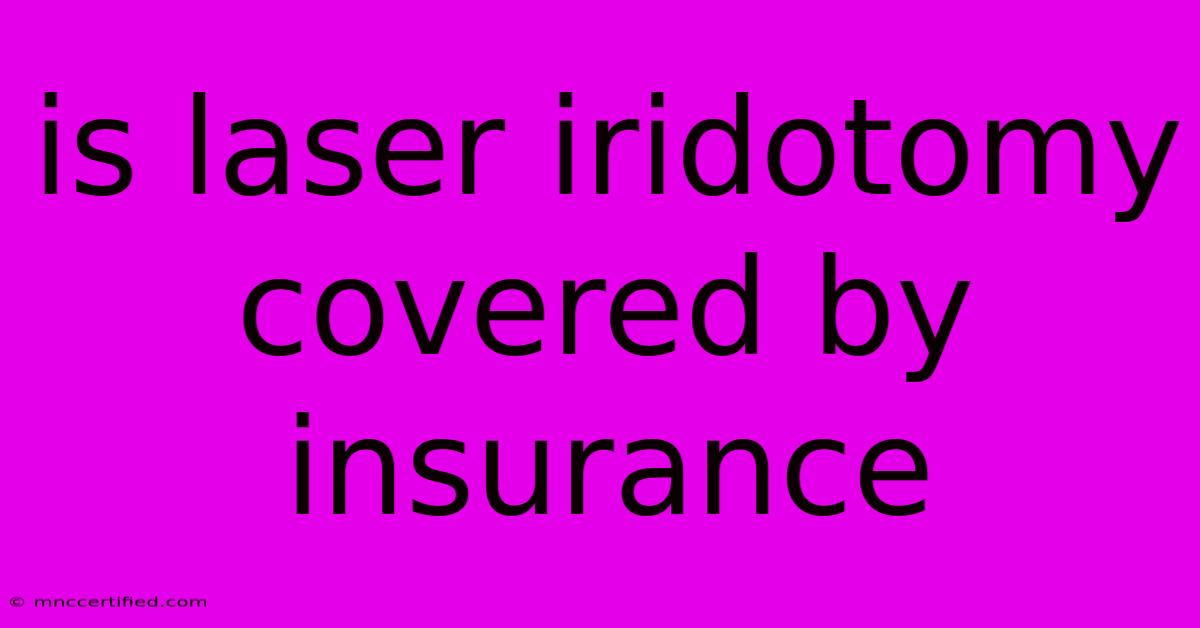Is Laser Iridotomy Covered By Insurance

Table of Contents
Is Laser Iridotomy Covered by Insurance? A Comprehensive Guide
Laser iridotomy is a common procedure used to treat angle-closure glaucoma, a condition that occurs when the iris, the colored part of the eye, blocks the flow of fluid from the eye. This can lead to a buildup of pressure within the eye, which can damage the optic nerve and lead to blindness.
If you've been diagnosed with angle-closure glaucoma or are at high risk of developing it, you might be wondering: Is laser iridotomy covered by insurance? The answer isn't straightforward, as coverage varies significantly depending on several factors.
Factors Affecting Insurance Coverage for Laser Iridotomy
1. Your Insurance Plan: Different health insurance plans have varying levels of coverage for eye care procedures.
- PPOs (Preferred Provider Organizations) generally offer broader coverage with less stringent requirements, making laser iridotomy more likely to be covered.
- HMOs (Health Maintenance Organizations) typically have a more limited network of providers and may require pre-authorization for the procedure.
- Medicare and Medicaid have their own specific coverage guidelines for eye care, which you should review carefully.
2. Medical Necessity: Insurance companies will only cover laser iridotomy if it's considered medically necessary. This means your doctor must clearly document the need for the procedure, demonstrating how it will prevent or treat angle-closure glaucoma.
3. Pre-Existing Conditions: Some insurance plans may have exclusions or limitations for pre-existing conditions. If you have a history of eye problems, your coverage for laser iridotomy might be affected.
4. Out-of-Network Providers: If you choose to see an eye doctor outside of your insurance network, you may have to pay a higher copay or deductible.
How to Determine Your Coverage
1. Contact Your Insurance Provider: The best way to determine your coverage for laser iridotomy is to contact your insurance company directly. Ask them about:
- Specific coverage for laser iridotomy
- Requirements for pre-authorization
- Copays and deductibles
2. Review Your Plan Documents: Carefully review your health insurance plan documents to understand your coverage for eye care and potential limitations.
3. Consult Your Eye Doctor: Your eye doctor can provide valuable insights into your coverage and guide you through the process of getting pre-authorization if necessary.
Alternative Options If Not Covered
If your insurance doesn't cover laser iridotomy, don't despair. There are several alternative options available, including:
- Exploring Financial Assistance Programs: Some organizations offer financial assistance for medical procedures.
- Negotiating Payment Plans: Discuss payment plans with your eye doctor to make the procedure more affordable.
- Consider a More Affordable Procedure: In some cases, alternative treatments like medications might be more affordable than laser iridotomy.
Conclusion
Determining whether laser iridotomy is covered by insurance depends on your specific plan, your medical history, and the requirements of your insurance provider. By contacting your insurer, reviewing your plan documents, and consulting with your eye doctor, you can gain a clearer understanding of your coverage and explore options for financing the procedure if necessary. Remember, prioritizing your eye health is crucial, and seeking professional medical advice is always recommended.

Thank you for visiting our website wich cover about Is Laser Iridotomy Covered By Insurance. We hope the information provided has been useful to you. Feel free to contact us if you have any questions or need further assistance. See you next time and dont miss to bookmark.
Featured Posts
-
Pioneer Security Life Insurance Reviews
Nov 09, 2024
-
Best Ladies Rolex To Buy For Investment
Nov 09, 2024
-
Bronny James Heads To G League Lakers Father Son Duo Delayed
Nov 09, 2024
-
India Aims For 2036 Olympics
Nov 09, 2024
-
Kent State University Health Insurance
Nov 09, 2024